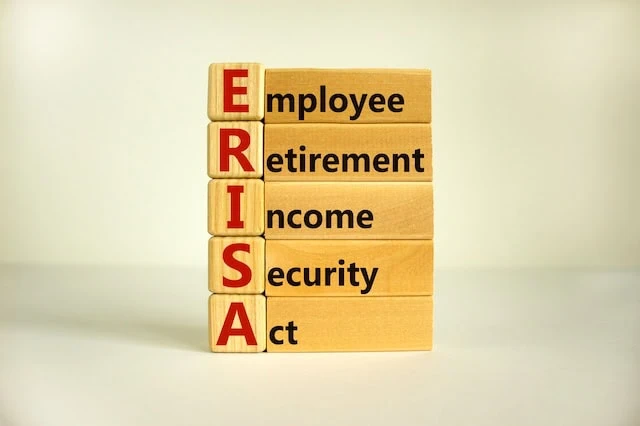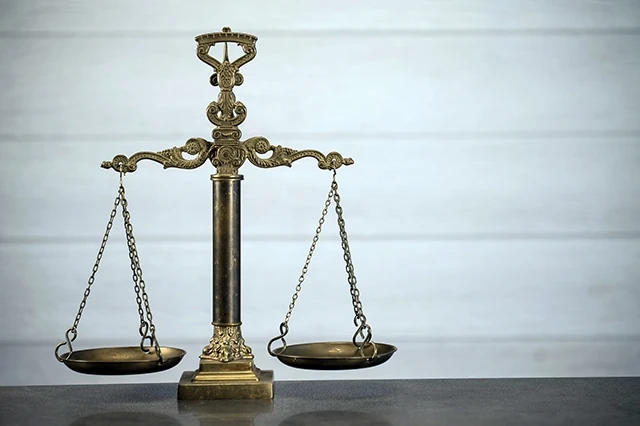This is Kyle, the editor of our weekly newsletter, The Weekend Tea, and if you actually made the choice to read this article, let me just say: I respect you.
Because, let’s be honest, most of us don’t actively seek out uncomfortable topics. Well, precious few topics are more uncomfortable than divorce, and mashing that topic up with a financial concern (like 401(k) beneficiaries) really makes people squirm.
I should know.
Divorce: It’s Not for Everyone (But It Is for a Lot of Us)
You’ve probably heard in broad terms that half of American marriages end in divorce.
Statistically speaking, that’s about right. Specifically, the American Psychological Association says that 40% to 50% of first marriages end in divorce, and there’s an even higher failure rate of 60% to 67% for second marriages.
But for many people, including myself, statistics just don’t hit you with their full force … until you become that statistic.
I’m Like Big Lou

My first job out of college was as a copy editor at a small newspaper in Ohio—briefly in news, but after a few months, I was lucky enough to shift over into editing for the sports desk. The hours were crap: I’d start at 4 or 5 p.m., leave at 1 or 2 a.m. But it did give me a pleasant, half-hour against-the-flow of traffic drive with nothing but my thoughts and sports radio.
I left the job, but not sports radio, which I listen to on Sirius XM all the time now. And if you put in as much time as I have, you’ll start to realize just how targeted you are as an audience. Vermont Teddy Bears. Pajamagrams. Little blue pills. Physical gold. 1-877-KARS-4-KIDS (Donate your car today!)
And, of course, life insurance.
If a smile just crept across your face, that means you too are aware of the advertising gems that are Big Lou Insurance commercials. These ads, which are chock full o’ playful nudges and winks, are directly aimed at guys (like me!) who are far from perfect and know it. It’s a masterclass of understanding your audience, with writing so skilled you can’t help but laugh when they call you “kind of porky.“
The end of each ad reminds you that you and “Big Lou” are in the same boat. For instance, at the end of one ad directed at men who have been divorced multiple times and are looking for a life insurance policy for their new wife, the radio announcer lets you know that “He’s like you … except he’s only on Number Two.”
My wife and I laugh every time we hear it.
Sure, that’s because it’s clever. But it’s also because I’m exactly like Big Lou—I’m on Number Two, too.
Don’t worry! I’m not going to bog you down with the sad story of my divorce. It was emotionally painful for the both of us, and dredging up details would do no one a lick of good.
Instead, I told you all of that to tell you this:
Throughout the filings and proceedings, I learned that our divorce was logistically easy. No kids. No house. No assets we needed to figure out how to split amid acrimony.
I still remember hearing the same thing over and over again, as it pertained to that aspect: “You’re lucky.”
Because most people aren’t so lucky! For instance, most of us are aware that if you have children by the time you’ve divorced, you could be in for a dreadful custody battle. And speaking directly to today’s topic: If you’ve had time to accumulate assets and accounts, your financial life could get messy, too.
It’s Good to Seek Out Advice About Uncomfortable Situations
Today, we’re going to talk about your retirement accounts as it pertains to divorce.
In truth, it’s not complicated—designating a beneficiary of, say, a 401(k) or an IRA is quite easy, and the rules are pretty straightforward.
The problem is that many people don’t think about these simple rules and practices right up until they matter. And at that point, they’re in the middle of an extremely emotional decision—the perfect conditions for messing up the easiest of things.
Young and the Invested Tip: Don’t fall into these common 401(k) money mistakes.
Our advice? It pays to suck it up and seek out financial lessons about life’s hardest moments (divorce, a loss of employment, even death) before you’re in the moment yourself. Because you’re much more likely to absorb the information when you’re cool, calm, and collected—and that will improve your chances of putting that information to proper use in the moment.
I know. That’s a lot of tea. So, let’s move on to the practical advice.
Divorce and Your Retirement Accounts
This week, we sat down with Michael DiFalco, a seasoned divorce attorney based in Long Island, New York, to talk about a critical financial aspect of divorce that many people don’t think about until it happens (and that many people forget even after it does!): retirement account beneficiaries.
How the beneficiary system works

Generally speaking, as soon as you open a retirement account—so, a 401(k), a 403(b), an individual retirement account (IRA), and so on—you will have the option to designate beneficiaries.
A beneficiary is a person who will receive some or all of the assets when you die. So, you can either elect to have one beneficiary receive all of an account’s assets when you die, or you can elect multiple beneficiaries who will receive a predetermined percentage of assets upon your death. (Example: You’re 21 and single. You have a 401(k). You designate your sister as a beneficiary at 40%, your mom at 30%, and your dad at 30%.)
But the law is a bit more specific when spouses are in the picture.
Employer-sponsored retirement plans (401(k), pensions, etc.): The most common area where spousal rules come into play is any account governed by the Employee Retirement Income Security Act (ERISA), which sets the standards for a wide variety of employee benefits, including everything from health, dental, vision, and disability insurance to health savings accounts (HRAs) and flexible spending accounts (FSAs) to vacation and severance benefits.
Young and the Invested Tip: Have a government pension? You’ll want to be familiar with this Social Security provision.
Pertinently, ERISA also oversees defined-benefit plans, such as pensions, and defined-contribution plans, such as the almighty 401(k).
“Under federal law, most workplace retirement plans are governed by ERISA,” DiFalco says. “And most plans that are governed by ERISA are very particular about the requirements and regulations that they impose on the plan administrators to follow the beneficiary designations to protect the third parties, especially spouses.”
When it comes to ERISA accounts, spouses are effectively a beneficiary default. If you have a spouse, then …
- If you do decide to designate a beneficiary, your spouse is entitled to 50% of your ERISA account funds after you pass. Thus, your spouse must be your primary beneficiary. You can designate one or more secondary beneficiaries, but only up to the remaining 50%.
- If you want someone other than your spouse to be the primary beneficiary on your account, your spouse must complete a spousal consent waiver that says they forgo their right to 50% of the account.
- If you never designate a beneficiary, your surviving spouse automatically inherits 100% of your ERISA account funds after you pass.
(A note on all of the above: This speaks to how ERISA protects spouses in the beneficiary chain. For instance, if you were married, you could go into your account and designate your mother as a 100% beneficiary. But when you pass away, the law will step in and make your spouse the primary beneficiary, entitled to 50% of your ERISA account funds.)
Individually managed accounts (IRAs, Roth IRAs, etc.): “IRAs are not covered by ERISA,” DiFalco says. “There’s less oversight and regulation.”
There’s no federal rule governing who you must choose as your beneficiary. For many, you can designate whoever you want, for whatever percent you want—your spouse isn’t entitled to anything. (But if you don’t designate anyone, your spouse might still receive some or all of those assets.)
There are state-level rules, however. Specifically, if you live in a “community property” state, the rules are similar to 401(k)s. Your spouse must be your primary beneficiary; you’ll have to get a spousal consent waiver if you want to name a non-spouse primary beneficiary.
Government plans: From the federal level down to the municipal level, government plans vary from one to the next. “They’re not protected by ERISA, either,” DiFalco says, “so we sometimes see police officers, teachers, etc., who are under completely different systems and do not require spousal consent.”
How does divorce factor into the beneficiary equation?

Divorce can throw a monkey wrench into your plans to pass along your assets. And that’s because being designated as a beneficiary actually imparts a lot of power.
“When you designate someone as a beneficiary on an account, particularly a retirement account, it’s intended to transfer that account to the designated beneficiaries, and when that happens, it passes outside your estate,” DiFalco says. “So whatever your will says, whatever the provisions for your estate plan, an account with a beneficiary designation will pass directly to the named beneficiaries.”
And that goes no matter who you have listed as your beneficiary.
Young and the Invested Tip: Spousal rights will follow you into retirement, too. If you haven’t already, you should get familiar with Social Security spousal benefits.
Thing is, when you divorce, your beneficiaries remain exactly the same unless you change them. Which means that the day your divorce is finalized, if you had previously listed your spouse as the beneficiary on any accounts, your now-ex-spouse remains the beneficiary on those accounts.
- Good news! Once you divorce, rules forcing your spouse to be the beneficiary go out the window. You don’t need a waiver; you can just log in and change your beneficiary to whomever you want.
- Bad news! If you don’t change that yourself, and you pass away, your now-ex-spouse will receive any assets from accounts where she’s still listed.
In a perfect world, the day after your divorce became finalized, if you logged onto Schwab, a window would pop up saying “Hey! I noticed you were single again! Have you thought about changing your designated beneficiaries?”
Sadly, there’s no Schwab Clippy coming to the rescue.
But at least a few states, including New York, have active statutes to deal with this.
“These statutes say you’ve presumptively revoked your former spouse as a beneficiary on any accounts once the divorce is finalized,” says DiFalco, who adds that “to my knowledge, not all states have that, and it might vary state to state as to what applies.”
In fact, these statutes may only offer a limited kind of relief. “In New York, it’s presumed that you have intended to revoke your spouse,” DiFalco says. “But it doesn’t affect, say, your sister-in-law, or your brother-in-law, or other family members of the spouse who you might have named as a second beneficiary.”
OK. Change my beneficiary. Sounds easy enough.
It is and it isn’t.
First off, there are rules about when you can change your beneficiary.
“I can only speak to New York, but in this state, you’re not allowed to change any beneficiaries while the divorce is pending, nor immediately before the divorce is filed,” says DiFalco, who adds that “if you’re ever thinking about a separation or divorce, it’s important to consult a local attorney.”
There’s also the very basic reality that life is busy, and life after a divorce is really busy. So it’s easy to simply forget to change beneficiaries—whether in the case of a divorce or other life changes.
“One of the other considerations that people need to give some thought to is when they have multiple children,” DiFalco says. “I often see that people don’t think about [their accounts] right after having their second or third child. They often just assume there’s some law that makes sure everything goes to all their children.
Young and the Invested Tip: The estate tax exemption just increased again. Find out how much it grew, and learn more about this tax break.
“But because (ERISA) accounts are typically passing outside the estate, it’s really important to add any additional children that might have been born after you initially designated beneficiaries on any plan.”
Also, there are a hundred or so other things you have to deal with in the wake of a divorce. Typically, retirement accounts from previous employers often don’t float their way to the top. So you have to remind yourself to check these accounts.
“It’s really helpful to be mindful about some of these old plans and take the initiative,” DiFalco says.
That doesn’t just mean determining whether you need to re-designate beneficiaries. It also means reevaluating the plan itself. Is it an old 401(k)? Well, review how it’s invested. If you like it, great. If you don’t, you might want to roll over your 401(k) into an IRA so you can make whatever changes you’d like in how those funds are being allocated.
What about other financial accounts?
“Generally, any account that has a possible beneficiary designation that says transfer on death or other survivorship beneficiary option is going to be governed similarly,” DiFalco says.
One area that DiFalco says he deals with frequently is life insurance.
“People thinking about a divorce don’t like the idea that their eventual ex-spouse could be the beneficiary on a life insurance policy,” he says. “That’s one thing people often change, and at least in New York, they’re governed by similar laws and rules.”
These types of assets—assets within an account that has a beneficiary designation, which are frequently referred to as “non-probate accounts”—typically will pass directly to the beneficiary without going through the estate.
Divorce is a fresh start … and that goes for your finances, too.

DiFalco notes that many people coming off a divorce use this change to either begin or overhaul their financial plans.
“Some people, depending on where they are in life, form new estate plans and establish living trusts (or other trusts) to make sure their children or heirs or other beneficiaries receive their assets,” he says. “I see that commonly at the end of divorces for middle-aged folks. They suddenly need to think about what life looks like for the next 20 years, even end-of-life plans … so now they have to think about how much wealth they’ve accumulated, how old the children are, any considerations about where children are living or if the children are in college.
Young and the Invested Tip: A good retirement withdrawal strategy can give you a better chance of maximizing the assets you can leave to your heirs.
“So coming up with a new estate plan is often the thing many people do after their divorce is finalized.”
And in many cases, divorce changes a person’s financial situation substantially.
“Maybe we’re talking about a situation where a person is receiving their half of the assets that someone else controlled,” DiFalco says. “So for the first time, they’re looking at a situation where they can designate a beneficiary, they’re managing the assets, they need a financial advisor. They’re asking themselves, ‘How do I manage my money?’ ‘How do I plan for retirement?’ ‘How do I plan to meet my expenses with some of these assets?’ It’s a very common inflection point for many people.”
—
The above article is from our Weekend Tea newsletter. Like what you’re reading but not yet a subscriber? Get our weekly financial insights and updates delivered to your inbox every Saturday morning by signing up for The Weekend Tea today! You can also follow WealthUp on Flipboard for more great advice and insights.






![10 Best Investments for Roth IRA Accounts [Tax-Smart Growth] 13 best investments for roth ira](https://youngandtheinvested.com/wp-content/uploads/best-investments-for-roth-ira.webp)
![How to Use Your HSA for Retirement [Tax-Efficient Investing Tool] 14 how to use your HSA in retirement](https://youngandtheinvested.com/wp-content/uploads/how-to-use-your-hsa-in-retirement-600x403.png.webp)
